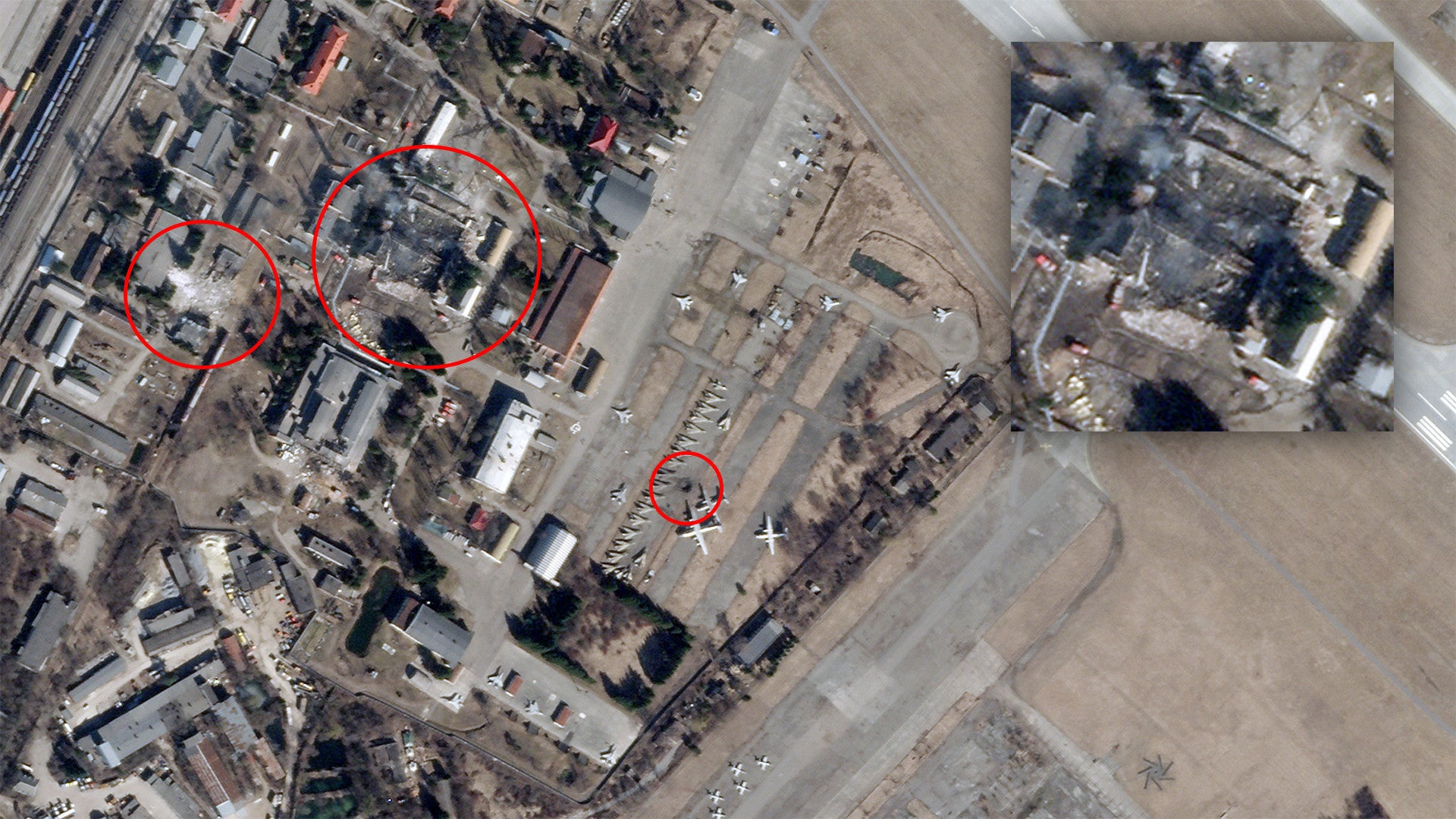Just hours after the strike occurred, The War Zone has obtained a high-resolution satellite image confirming that Russian missiles hammered the Lviv State Aircraft Repair Plant, destroying a large hangar there and causing other damage. This state-owned enterprise is the only one in the country that is capable of performing major maintenance on the Ukrainian Air Force’s MiG-29 Fulcrum fighter jets. Those aircraft have been one of a number of factors that have prevented Russian forces from gaining air superiority in the conflict so far.
The Planet Labs image, portions of which are seen below and at the top of this story, was taken at 9:08 AM UTC, or around 11:08 AM local time in Lviv. In addition to the destroyed hangar, the destruction of another structure immediately to the west can be seen. There is also an impact crater on an outdoor aircraft parking area on the eastern side of the plant. It’s not clear if any aircraft were damaged or destroyed in the strike, but it’s worth noting that the aircraft closest to the crater are nonoperational types. In addition to a number of MiG-29s, there are older MiG-23/27 and MiG-21 combat jets, as well as airlifters, which Ukraine no longer flies, visible outside in the imagery of the facility. It’s important to note that this facility services foreign aircraft, too.


Earlier today, Ukrainian authorities said that the Russians fired six unspecified cruise missiles at the Lviv State Aircraft Repair Plant, but that two were intercepted. Local officials say there were no casualties as a result of the strikes. Some initial reports had suggested that Lviv’s Danylo Halytskyi International Airport, to which the plant is attached, might have been the target, but this has turned out to be incorrect.

It’s not clear what the immediate impacts of today’s strike on the Ukrainian Air Force’s ability to continue operating its MiG-29s might be. Some degree of maintenance work would always have been conducted at the bases where those jets operate from. At the same time, the loss of the hangar and other damage at the facility Lviv could limit the available options for performing more serious repairs, including on aircraft that have suffered battle damage.
Beyond that, the strike on this depot could make it even more difficult for the Ukrainian government to potentially acquire additional MiG-29s and get them into action. This is something that has been a topic of major discussion in the past week or so, as you can read more about here.
This is not the first time Russian forces appear to have directly targeted Ukraine’s ability to sustain its MiG-29s. On March 11, Russian missiles hit the Motor repair plant in the western city of Lutsk, which is the sole facility in the country for conducting major maintenance on the RD-33 jet engines that power the Ukrainian Air Force’s Fulcrums. That facility is also where, among other things, similar work is done on AL-21F and AL-31F engines used on Ukrainian Su-24 Fencer and Su-27 Flanker combat jets, respectively, as well.

It would make sense that Russia’s military, which has so far been unable to gain air superiority over Ukraine, would target facilities that sustain the Ukrainian Air Force’s combat jet fleets. Ukraine’s MiG-29 and Su-27 fighters, together with ground-based air defenses, have been important in keeping the skies over the country contested after more than three weeks.
In addition, today’s strike on the Lviv State Aircraft Repair Plant is the first time in weeks that missiles have rained down inside the city’s limits, underscoring the Russian military’s recent apparent attempts to expand the scope of its operations into this part of Ukraine. The western half of the country had previously been left largely unscathed after an initial round of strikes early in the conflict back in Febraury. Lviv, which is just over 40 miles from the Polish border, has been a particularly important hub for aid of various kinds coming into the country. Russian officials have threatened more than once to target foreign military aid shipments arriving in Ukraine and this appears to have been the main reason for an earlier strike on the Ukrainian military training facility at Yavoriv, which is situated even closer to Poland.
All told, the strikes in Lviv today would seem to reflect a new Russian military effort to target infrastructure that directly supports the Ukrainian Air Force. They also appear to be part of an emerging strategy to try to prevent Ukrainian forces from operating from the western part of the country with impunity.
Contact the author: joe@thedrive.com
